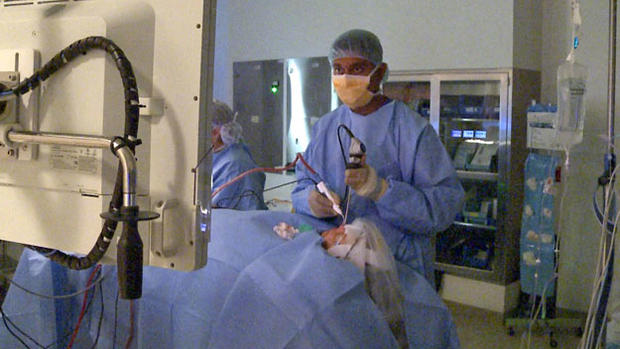New Sinus Surgery Provides Relief, Quick Recovery
BOSTON (CBS) - Chronic sinusitis is one of the most common reasons people head to the doctor.
Mild cases can be treated with antibiotics, but more severe cases may require surgery. In the past, many patients have avoided surgery because of painful side effects and a long recovery period.
Now a new approach is being used which has patients breathing freely almost immediately.
Lori Whalen of Plymouth loves to walk around her garden. She really appreciates it now that she can smell the lilacs. "I can smell everything in my yard now."
Breathing freely was something Lori had more or less forgotten how to do. Touching her sinus area, she said, "I had a great deal of pain and pressure here and there, and all through my head."
Like about 1/7 Americans, Lori had chronic sinusitis. This occurs when sinus tissue is so inflamed that fluids don't drain and then become infected.
Lori said she felt horrible for about two months, despite repeated cycles of powerful antibiotics.
Finally, Lori went to see Dr. Anit Patel, an ENT specialist at the Beth Israel Deaconess in Plymouth. He is now doing a less invasive method of sinus surgery.
"It's a big difference," said Dr. Patel. "Traditionally with sinus surgery, you are removing a lot of tissue and bone, and these days, we don't do that."
Instead, with a slender probe and a video monitor, Dr. Patel can avoid any incisions, and still open the passage ways by removing diseased tissue.
Then he implants a device known as "Propel". It springs open after being inserted in to the sinus area. It keeps the passage open while emitting a localized steroid over several weeks. Propel dissolves in 2-3 weeks after having kept inflammation down.
"That steroid is only local, as opposed to taking a steroid by mouth, which can have side effects throughout the entire body," explained Dr. Patel.
Recovery from this procedure is a big improvement. "Traditionally you are out of work 2-3 weeks. You have those large packs that come out of your nose. You have black eyes," said Dr. Patel.
With this approach, the recovery is much faster. "Patients can usually get back to work within a few days, if not that very next day," added Dr. Patel.
Lori said the pain and discomfort was surprisingly non-existent. "Dental appointments, cleanings are worse."
Anyone with a pollen allergy knows these past few months have been brutal. Conditions like that can make sinusitis that much worse.
"The pollen count is sky high," said Dr. Patel. "When you are inhaling the pollen, it lands in the tissues in your nose and it causes swelling of that tissue."
But it didn't for Lori. She got her garden planted just the way she likes, with barely a sniffle.




